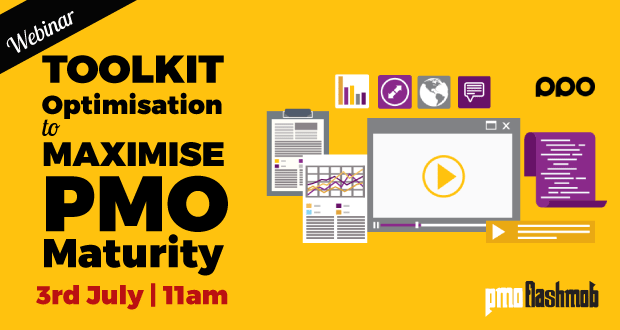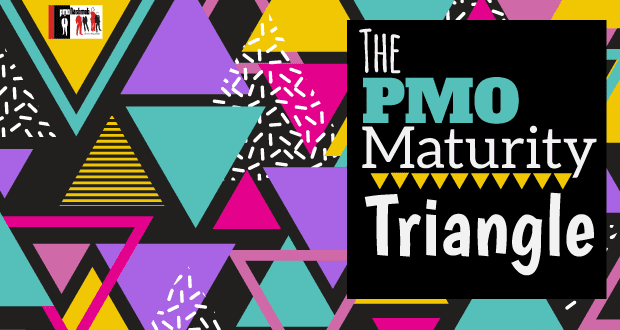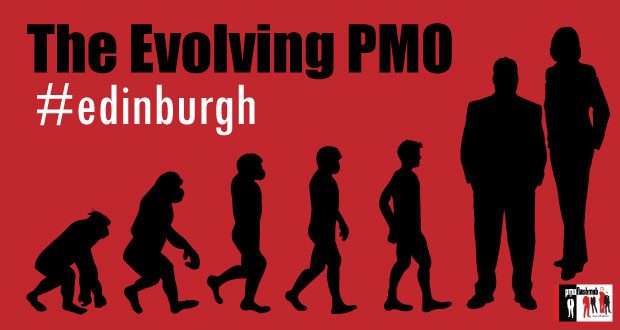
The maturity of the PMO has been a theme area that lots of PMO practitioners have been interested in for a while now. It's certainly something that is talked about at PMO Flashmob events and at last year's PMO Conference this theme was explored by Guy Jelley at PPO and it went down a storm. Delegates loved it, so we thought the rest of the PMO Flashmobbers would love it too.
Here's what it is about:
The common misconception for PMOs is that by focusing inward on increasing project management maturity, its portfolios, programmes and projects will be delivered more effectively. The reality is that it’s the people, process, governance, technology and ORGANISATION that play a crucial role in improving the organisation’s project delivery capability.
Typically, PMO leaders have an arsenal of tools to overcome PMO challenges like portfolio visibility and reporting, project prioritisation or resource capacity planning. Irrespective of what’s in your toolkit, the reality is that only with the effective usage of these tools will PMOs be able to maximise their maturity.
You’ll learn:
How to map your toolkit’s capabilities to your current maturity level
How to optimise your toolkit to your current and then targeted project management maturity level
Lessons learnt and proven approach to the effective usage of your tools
It doesn't matter what your tools are - how you optimise what you have got is the first step to greater PMO maturity. Interested? Watch the recording now:
Go to article
Susie is the Head of PMO and Change at the Open University, this session, following the Open University’s
recent award for PMO of the Year from the Association for Project Management is both a reflective and proactive look at the role of the Open University PMO as it transitioned from project support to a strategic partner; the lynch pin to their £100million change portfolio. The session will explore how the OU PMO chose to act as a catalyst for change, their role in using change management as an essential component to project and PMO success, and how they actively challenged blocking behaviours.
Go to article

Back in March, after the Project Challenge show we had an evening we called the PMO Maturity Triangle.
The evening was all about maturity and why the triangle? It was about the three areas of maturity that affect you, that’s:
Organisational maturity – the organisation and it’s project management maturity.
PMO maturity – that’s the PMO’s own maturity in how it performs, what it offers etc.
Your maturity – that’s your own individual capability and how you perform your role.
It was a roundtable event with some presentation materials thrown in to generate the discussion around these three areas.
In terms of output - especially around the final one - your maturity - we're in the process of setting up a working group to explore this further because we know just how many of you would like to see some kind of development in something like a competency framework for PMO people. We'll let you know when we launch the first working group.
So in terms of the other two sides of the triangle, here's an overview of what we looked into.
Go to article

About the PMO Mini-Masterclass - Evolving the PMO
Ever heard the PMO statistic that many PMOs have a shelf life on average of three years? We’re back in Edinburgh – at the heart of Scottish Government – to discuss what this statistic actually means – is it that PMOs are actually disbanded after three years or is it more likely that PMOs evolve and change since their initial incarnation into something else?
If this is the case, why is that? What changes do the PMO have to make? And is it a push or pull evolution? Lots of questions that need answers! We’ll also be looking at getting the PMO ready for evolution and also what future states of the PMO can look like. We’ll explore the potential differences in the functions and services from now and into the future.
The evening session included:
What factors could drive the evolution of a PMO?
What models might we consider in the evolution?
Where do maturity models figure in the evolution?
An insight into what is driving the PMO at the Scottish Government
What out practitioners need to stop, start and continue doing in their PMO.
Go to article
The Portfolio Management Office forms the bridge between the organisation’s strategy and its change portfolio. It enables delivery of the strategy and serves to prove and improve delivery of change.
Providing these services in an investment bank is a challenge. This is an environment which demands pace and tangible outcomes; it is subject to extraordinary external pressures and scrutiny; and it is where the need for portfolio management is increasing.
The way we provide portfolio management into this environment needs to quickly mature to remain valuable. A critical factor for a successful Portfolio Management Office is to show measurable value in the way it forms the bridge between strategy and the change portfolio.
Takeaways:
How bridging strategy to the change portfolio drives PMO value
How the investment banking as a relative newcomer is influencing PMO practises
How maturing at pace should become business as usual for the PMO
The Video
Go to article
In this session Henny Portman will take you with him to get an understanding of the role of a CoE, the functions a CoE can perform e.g. standards and methods, internal consultancy, organisational learning and knowledge management, and people and skills. Theory will be combined with his own experiences, resulting in best and good practises. He will show you an overview of more than 50 different standards and methods and how to cope with that from a CoE perspective.
Takeaways:
Understanding the CoE concept
Good & best practices for CoE’s
Get insights in the PM(O) standards wood and don’t get lost
The Video
Go to article



